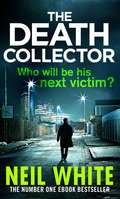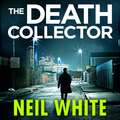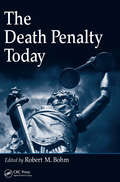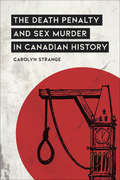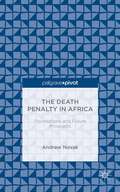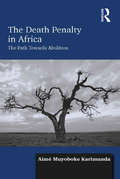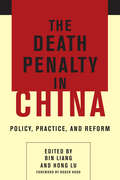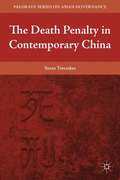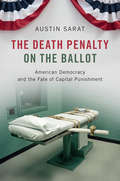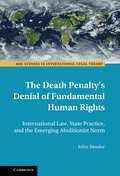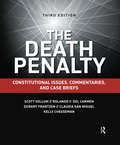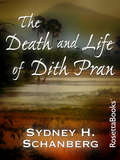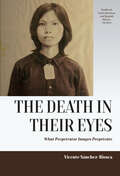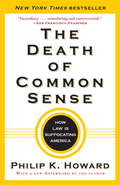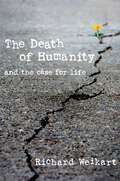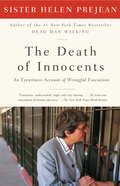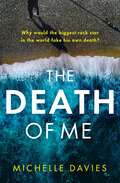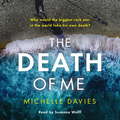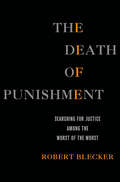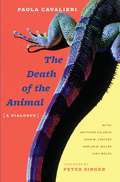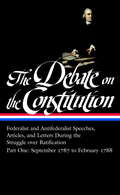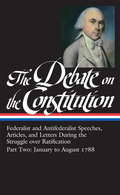- Table View
- List View
The Death Collector
by Neil WhiteJoe Parker is Manchester's top criminal defence lawyer and Sam Parker - his brother - is a brilliant detective with the Greater Manchester Police force. Together they must solve a puzzling case that is chilling Manchester to the bone... The Death Collector is charming, sophisticated and intelligent, but he likes to dominate women, to make them give themselves to him completely; to surrender their dignity and their lives. He's a collector of beautiful things, so once he traps them he'll never let them go. Joe is drawn into the Death Collector's world and when the case becomes dangerous, Sam is the first person he turns to. In this gripping thriller, danger lurks for not only the Parker brothers, but also those closest to them.
The Death Collector
by Neil WhiteJoe Parker is Manchester's top criminal defence lawyer and Sam Parker - his brother - is a brilliant detective with the Greater Manchester Police force. Together they must solve a puzzling case that is chilling Manchester to the bone... The Death Collector is charming, sophisticated and intelligent, but he likes to dominate women, to make them give themselves to him completely; to surrender their dignity and their lives. He's a collector of beautiful things, so once he traps them he'll never let them go. Joe is drawn into the Death Collector's world and when the case becomes dangerous, Sam is the first person he turns to. In this gripping thriller, danger lurks for not only the Parker brothers, but also those closest to them.
The Death Collector
by Neil WhiteJoe Parker is Manchester's top criminal defence lawyer and Sam Parker - his brother is a brilliant detective with the Greater Manchester Police force. Together they must solve a puzzling case that is chilling Manchester to the bone...The Death Collector is charming, sophisticated and intelligent, but he likes to dominate women, to make them give themselves to him completely; to surrender their dignity and their lives. He's a collector of beautiful things, so once he traps them he'll never let them go.Joe is drawn into the Death Collector's world and when the case becomes dangerous, Sam is the first person he turns to. In this gripping thriller, danger lurks for not only the Parker brothers, but also those closest to them.
The Death Penalty Today
by Robert M. BohmMore than 30 years after the US Supreme Court reinstated the death penalty, it is still plagued with egregious problems. Issues of wrongful conviction, inhumane practices, and its efficacy as a deterrent are hotly debated topics. As of August 2007, two-thirds of the worlds countries have abolished the death penalty. Today, the US falls alongside I
The Death Penalty and Sex Murder in Canadian History (Osgoode Society for Canadian Legal History)
by Carolyn StrangeFrom Confederation to the partial abolition of the death penalty a century later, defendants convicted of sexually motivated killings and sexually violent homicides in Canada were more likely than any other condemned criminals to be executed for their crimes. Despite the emergence of psychiatric expertise in criminal trials, moral disgust and anger proved more potent in courtrooms, the public mind, and the hearts of the bureaucrats and politicians responsible for determining the outcome of capital cases. Wherever death has been set as the ultimate criminal penalty, the poor, minority groups, and stigmatized peoples have been more likely to be accused, convicted, and executed. Although the vast majority of convicted sex killers were white, Canada’s racist notions of "the Indian mind" meant that Indigenous defendants faced the presumption of guilt. Black defendants were also subjected to discriminatory treatment, including near lynchings. In debates about capital punishment, abolitionists expressed concern that prejudices and poverty created the prospect of wrongful convictions. Unique in the ways it reveals the emotional drivers of capital punishment in delivering inequitable outcomes, The Death Penalty and Sex Murder in Canadian History provides a thorough overview of sex murder and the death penalty in Canada. It serves as an essential history and a richly documented cautionary tale for the present.
The Death Penalty in Africa: Foundations and Future Prospects
by Andrew NovakIn recent years the death penalty has sharply declined across Africa, but this trend belies actual public opinion and the retributivist sentiments held by political elites. This study explains capital punishment in Africa in terms of culturally specific notions of life and death as well as the colonial-era imposition of criminal and penal policy.
The Death Penalty in Africa: The Path Towards Abolition
by Aimé Muyoboke KarimundaHuman development is not simply about wealth and economic well-being, it is also dependent upon shared values that cherish the sanctity of human life. Using comparative methods, archival research and quantitative findings, this book explores the historical and cultural background of the death penalty in Africa, analysing the law and practice of the death penalty under European and Asian laws in Africa before independence. Showing progressive attitudes to punishment rooted in both traditional and modern concepts of human dignity, Aimé Muyoboke Karimunda assesses the ground on which the death penalty is retained today. Providing a full and balanced appraisal of the arguments, the book presents a clear and compelling case for the total abolition of the death penalty throughout Africa. This book is essential reading for human rights lawyers, legal anthropologists, historians, political analysts and anyone else interested in promoting democracy and the protection of fundamental human rights in Africa.
The Death Penalty in China
by Hong Lu Roger Hood Bin LiangChina currently leads the world in death sentences and executions, making it a primary target for the global abolition movement. While the results have been subtle, anti-death penalty advocates are beginning to influence Chinese attitudes toward the practice, as well as law. Conducting an interdisciplinary and comparative study of China's death penalty as the country heads toward reform, this book explains what it took to advance reforms to limit death sentences and executions, while identifying the challenges that prevent more extensive progress. Featuring experts from Europe, Australia, Japan, China, and the United States, this collection follows changes in the theory and policy of China's death penalty from the Mao era (1949-1979) through the Deng era (1980-1997) up to the present day. Using empirical data, such as capital offender and offense profiles, temporal and regional variations in capital punishment, and the impact of social media on public opinion and reform, contributors relay both the particular character of China's death penalty practices and the incremental changes that indicate reform. They then compare the Chinese experience to other countries throughout Asia and the world, showing how change can be implemented even within a non-democratic and rigid political system, but also the dangers of pushing policies that society may not be ready to embrace.
The Death Penalty in China: Policy, Practice, and Reform
by Lu Liang Bin HongFeaturing experts from Europe, Australia, Japan, China, and the United States, this collection of essays follows changes in the theory and policy of China's death penalty from the Mao era (1949–1979) through the Deng era (1980–1997) up to the present day. Using empirical data, such as capital offender and offense profiles, temporal and regional variations in capital punishment, and the impact of social media on public opinion and reform, contributors relay both the character of China's death penalty practices and the incremental changes that indicate reform. They then compare the Chinese experience to other countries throughout Asia and the world, showing how change can be implemented even within a non-democratic and rigid political system, but also the dangers of promoting policies that society may not be ready to embrace.
The Death Penalty in Contemporary China
by Susan TrevaskesChina's infamous death penalty record is the product of firm Party-state control and policy-setting. Though during the 1980s and 1990s, the Party's emphasis was on "kill many," in the 2000s the direction of policy began to move toward "kill fewer. " This book details the policies, institutions, and story behind the reform of the death penalty.
The Death Penalty on the Ballot: American Democracy and the Fate of Capital Punishment
by Austin SaratInvestigating the attitudes about capital punishment in contemporary America, this book poses the question: can ending the death penalty be done democratically? How is it that a liberal democracy like the United States shares the distinction of being a leading proponent of the death penalty with some of the world's most repressive regimes? Reporting on the first study of initiative and referendum processes used to decide the fate of the death penalty in the United States, this book explains how these processes have played an important, but generally neglected, role in the recent history of America's death penalty. While numerous scholars have argued that the death penalty is incompatible with democracy and that it cannot be reconciled with democracy's underlying commitment to respect the equal dignity of all, Professor Austin Sarat offers the first study of what happens when the public gets to decide on the fate of capital punishment.
The Death Penalty's Denial of Fundamental Human Rights: International Law, State Practice, and the Emerging Abolitionist Norm (ASIL Studies in International Legal Theory)
by John BesslerThe Death Penalty's Denial of Fundamental Human Rights details how capital punishment violates universal human rights-to life; to be free from torture and other forms of cruelty; to be treated in a non-arbitrary, non-discriminatory manner; and to dignity. In tracing the evolution of the world's understanding of torture, which now absolutely prohibits physical and psychological torture, the book argues that an immutable characteristic of capital punishment-already outlawed in many countries and American states-is that it makes use of death threats. Mock executions and other credible death threats, in fact, have long been treated as torturous acts. When crime victims are threatened with death and are helpless to prevent their deaths, for example, courts routinely find such threats inflict psychological torture. With simulated executions and non-lethal corporal punishments already prohibited as torturous acts, death sentences and real executions, the book contends, must be classified as torturous acts, too.
The Death Penalty: Constitutional Issues, Commentaries, and Case Briefs
by Rolando V. del Carmen Scott Vollum Durant Frantzen Claudia San Miguel Kelly CheesemanThe Death Penalty, Third Edition, brings together all the legal issues related to the death penalty and provides case briefs for the most important United States Supreme Court death penalty cases. No other book available brings together a discussion of the major constitutional issues surrounding the death penalty with a broad array of associated case briefs. The authors classify cases according to legal issues and provide a commentary on the various sub-topics, presenting legal materials in an easily understood form. Though the primary audiences of the book are undergraduates in criminal justice programs and practitioners in the corrections and justice systems, the book will also prove useful to anyone who has an interest in the death penalty, the criminal justice system, or the United States Constitution. Every chapter starts with commentaries regarding general case law in a sub-topic, such as aggravating and mitigating factors, followed by a chart of the cases briefed in the chapter, and then the case briefs. These case briefs acquaint the reader with Supreme Court cases by summarizing facts, issues, reasons, and holdings. The Death Penalty, Third Edition , is a succinct, trusted guide to the law of capital punishment in the United States.
The Death and Life of Dith Pran
by Sydney H. SchanbergThe US journalist&’s account of his colleague&’s struggle to survive the Cambodian genocide—the basis for the Oscar–winning film The Killing Fields. On April 17, 1975, Khmer Rouge soldiers seized Phnom Penh—the capital of Cambodia—and began a brutal genocide that left millions dead. Dith Pran, a Cambodian working as an assistant to American reporter Sydney H. Schanberg, was a witness to these events. While his employer managed to escape across the border, Dith Pran fled into the Cambodian countryside—and into the heart of the massacre. The basis for the acclaimed movie The Killing Fields, this is the compelling account of the days before the fall of Phnom Penh. It&’s the story of one man&’s struggle for survival in a country that had become a death camp for millions of its citizens—and another man&’s failed efforts to keep his friend and colleague safe. Written within a year of the atrocities committed by the Khmer Rouge, it is a work of both historical and literary significance. Sydney H. Schanberg contributed a moving new foreword to this first eBook edition.
The Death in their Eyes: What Perpetrator Images Perpetrate (Studies in Latin American and Spanish History #12)
by Vicente Sánchez-BioscaImages that embody the point of view of the perpetrators of violent crimes, or their accomplices, force us to look at the pain of victims through the eyes of those who caused it. Accompanied by over sixty visuals of historically infamous violence, The Death in their Eyes goes beyond the visible aspects of images to reveal what has been left outside of the frame. Covering human abuse and humiliation at Abu Ghraib, the Auschwitz Album, religious desecration during the Spanish Civil War, an unfinished Nazi propaganda film made at the Warsaw Ghetto in the spring of 1942, and detainees at the S-21 torture center in Cambodia under the Khmer Rouge, this volume proposes a rigorous new methodology for analyzing perpetrator images, in photography and film, that continue to be used and re-appropriated in today’s media. Content warning: This book contains images of victims of murder and torture which are essential to the author’s analysis.
The Death of Common Sense: How Law Is Suffocating America
by Philip K. HowardDistressing, disturbing, devastatingly detailed--this stunning examination of how modern laws are diminishing America exposes the drawbacks of rule-bound government, tells why nothing gets done, reveals the phony pretensions of law, and shows why well-intentioned laws have actually devalued rights. In short, The Death of Common Sense demonstrates how the buck never stops and how ell-meaning laws are creating a nation of enemies. (Poltics/Current Events)From the Hardcover edition.
The Death of Humanity: and the Case for Life
by Richard WeikartDo you believe human life is inherently valuable? Unfortunately, in the secularized age of state-sanctioned euthanasia and abortion-on-demand, many are losing faith in the simple value of human life. To the disillusioned, human beings are a cosmic accident whose intrinsic value is worth no more than other animals.The Death of Humanity explores our culture's declining respect for the sanctity of human life, drawing on philosophy and history to reveal the dark road ahead for society if we lose our faith in human life.
The Death of Innocents
by Helen PrejeanFrom the author of the national bestseller Dead Man Walking comes a brave and fiercely argued new book that tests the moral edge of the debate on capital punishment: What if we're executing innocent men? Two cases in point are Dobie Gillis Williams, an indigent black man with an IQ of 65, and Joseph Roger O'Dell. Both were convicted of murder on flimsy evidence (O'Dell's principal accuser was a jailhouse informant who later recanted his testimony). Both were executed in spite of numerous appeals. Sister Helen Prejean watched both of them die.As she recounts these men's cases and takes us through their terrible last moments, Prejean brilliantly dismantles the legal and religious arguments that have been used to justify the death penalty. Riveting, moving, and ultimately damning, The Death of Innocents is a book we dare not ignore.From the Trade Paperback edition.ng on the forensic evidence, which he claimed would exonerate him, but the courts refused. After his execution on July 23, 1997, the state destroyed the evidence. As a result, its conviction of O'Dell could never be scrutinized. "The reader of this book will be the first 'jury' with access to all the evidence the trial juries never saw," says Prejean, who accompanied both men to their executions. By using the withheld evidence to reconstruct the crimes for which these two men were convicted, Prejean shows how race, prosecutorial ambition, poverty, election cycles, and publicity play far too great a role in determining who dies and who lives.Prejean traces the historical underpinnings of executions in this country, demonstrating that it is no accident that over 80 percent of executions in the past twenty-five years have been carried out in the former slave states. She also raises profound constitutional questions about an appeals system that decides most death cases on procedural grounds without ever examining their merits.To date, 113 wrongfully convicted persons have been freed from death row. If constitutional protections-due process, assistance of counsel, and equal justice under law-are truly being respected, how is it possible that these people were convicted in the first place? And how can we accept a system so rife with error?Sister Helen Prejean takes us with her on her spiritual journey as she accompanies two possibly innocent human beings to their deaths at the hands of the state. Prejean implores us to reflect on what is perhaps the core moral issue of the death penalty debate: Honorable people disagree about the justice of executing the guilty, but can anyone argue about the injustice of executing the innocent?From the Hardcover edition.
The Death of Me
by Michelle Davies'A twisting tale about the dark undercurrents of fame and fortune. You'll read THE DEATH OF ME with your heart in your mouth.' Erin Kelly Is one of music's greatest mysteries about to be solved?'He was a massive star until he did a headline grabbing retreat from the spotlight - but his disappearing act was FAKED. Fans won't be happy when they find out - his reputation was dead in the water.'When Isaac Naylor committed suicide after a teenage fan was found dead in his hotel room, the world thought it had lost one of the greatest rock stars of a generation. Naylor, lead singer of The Ospreys, had been arrested for causing the girl's death and was on police bail when he drowned himself in the sea off the Devon coast.Now, eight years on, music journalist Natalie Glass stumbles across a blind item on a US gossip website that suggests Naylor's death wasn't quite what it seemed - and he might in fact still be alive.But as she delves deeper into what happened, Natalie finds she has a stark choice: give up trying to find out what happened to Naylor or risk her own obituary ending up in print.
The Death of Me
by Michelle DaviesWhen Isaac Naylor committed suicide after a teenage fan was found dead in his hotel room, the world thought it had lost one of the greatest rock stars of a generation. Naylor, lead singer of The Ospreys, had been arrested for causing the girl's death and was on police bail when he drowned himself in the sea off the Devon coast, leaving two notes addressed to his bandmates and his younger brother, Toby, discarded on the beach.Now, eight years on, music journalist Natalie Glass stumbles across a blind item on a US gossip website that suggests Naylor's death wasn't quite what it seemed - and he might in fact still be alive. The item claims he is the mystery songwriter who has for the past year been submitting lyrics to producers in London via his lawyer for other artists to record. He insists on anonymity and the only person who knows his identity is the lawyer.But as she delves deeper into what happened, the plot to stop her intensifies and Natalie finds she has a stark choice: give up trying to find out what happened to Naylor or risk her own obituary ending up in print.
The Death of Punishment: Searching for Justice among the Worst of the Worst
by Robert BleckerFor twelve years Robert Blecker, a criminal law professor, wandered freely inside Lorton Central Prison, armed only with cigarettes and a tape recorder. The Death of Punishment tests legal philosophy against the reality and wisdom of street criminals and their guards. Some killers' poignant circumstances should lead us to mercy; others show clearly why they should die. After thousands of hours over twenty-five years inside maximum security prisons and on death rows in seven states, the history and philosophy professor exposes the perversity of justice: Inside prison, ironically, it's nobody's job to punish. Thus the worst criminals often live the best lives. The Death of Punishment challenges the reader to refine deeply held beliefs on life and death as punishment that flare up with every news story of a heinous crime. It argues that society must redesign life and death in prison to make the punishment more nearly fit the crime. It closes with the final irony: If we make prison the punishment it should be, we may well abolish the very death penalty justice now requires.
The Death of the Animal: A Dialogue
by Paola CavalieriWhile moral perfectionists rank conscious beings according to their cognitive abilities, Paola Cavalieri launches a more inclusive defense of all forms of subjectivity. In concert with Peter Singer, J. M. Coetzee, Harlan B. Miller, and other leading animal studies scholars, she expands our understanding of the nonhuman in such a way that the derogatory category of "the animal" becomes meaningless. In so doing, she presents a nonhierachical approach to ethics that better respects the value of the conscious self.Cavalieri opens with a dialogue between two imagined philosophers, laying out her challenge to moral perfectionism and tracing its influence on our attitudes toward the "unworthy." She then follows with a roundtable "multilogue" which takes on the role of reason in ethics and the boundaries of moral status. Coetzee, Nobel Prize winner for Literature and author of The Lives of Animals, emphasizes the animality of human beings; Miller, a prominent analytic philosopher at Virginia Polytechnic Institute, dismantles the rationalizations of human bias; Cary Wolfe, professor of English at Rice University, advocates an active exposure to other worlds and beings; and Matthew Calarco, author of Zoographies: The Question of the Animal from Heidegger to Derrida, extends ethical consideration to entities that traditionally have little or no moral status, such as plants and ecosystems. As Peter Singer writes in his foreword, the implications of this conversation extend far beyond the issue of the moral status of animals. They "get to the heart of some important differences about how we should do philosophy, and how philosophy can relate to our everyday life." From the divergences between analytical and continental approaches to the relevance of posthumanist thinking in contemporary ethics, the psychology of speciesism, and the practical consequences of an antiperfectionist stance, The Death of the Animal confronts issues that will concern anyone interested in a serious study of morality.
The Debate on the Constitution Part 1: Federalist and Antifederalist Speeches
by Various Bernard BailynHere, on a scale unmatched by any previous collection, is the extraordinary energy and eloquence of our first national political campaign: During the secret proceedings of the Constitutional Convention in 1787, the framers created a fundamentally new national plan to replace the Articles of Confederation and then submitted it to conventions in each state for ratification. Immediately, a fierce storm of argument broke. Federalist supporters, Antifederalist opponents, and seekers of a middle ground strove to balance public order and personal liberty as they praised, condemned, challenged, and analyzed the new Constitution Gathering hundreds of original texts by Franklin, Madison, Jefferson, Washington, and Patrick Henry--as well as many others less well known today--this unrivaled collection allows readers to experience firsthand the intense year-long struggle that created what remains the world's oldest working national charter.Assembled here in chronological order are hundreds of newspaper articles, pamphlets, speeches, and private letters written or delivered in the aftermath of the Constitutional Convention. Along with familiar figures like Franklin, Madison, Patrick Henry, Jefferson, and Washington, scores of less famous citizens are represented, all speaking clearly and passionately about government. The most famous writings of the ratification struggle -- the Federalist essays of Hamilton and Madison -- are placed in their original context, alongside the arguments of able antagonists, such as "Brutus" and the "Federal Farmer."Part One includes press polemics and private commentaries from September1787 to January 1788. That autumn, powerful arguments were made against the new charter by Virginian George Mason and the still-unidentified "Federal Farmer," while in New York newspapers, the Federalist essays initiated a brilliant defense. Dozens of speeches from the state ratifying conventions show how the "draft of a plan, nothing but a dead letter," in Madison's words, had "life and validity...breathed into it by the voice of the people." Included are the conventions in Pennsylvania, where James Wilson confronted the democratic skepticism of those representing the western frontier, and in Massachusetts, where John Hancock and Samuel Adams forged a crucial compromise that saved the country from years of political convulsion.Informative notes, biographical profiles of all writers, speakers, and recipients, and a detailed chronology of relevant events from 1774 to 1804 provide fascinating background. A general index allows readers to follow specific topics, and an appendix includes the Declaration of Independence, the Articles of Confederation, and the Constitution (with all amendments).
The Debate on the Constitution Part 2: Federalist and Antifederalist Speeches
by Various Bernard BailynHere, on a scale unmatched by any previous collection, is the extraordinary energy and eloquence of our first national political campaign: During the secret proceedings of the Constitutional Convention in 1787, the framers created a fundamentally new national plan to replace the Articles of Confederation and then submitted it to conventions in each state for ratification. Immediately, a fierce storm of argument broke. Federalist supporters, Antifederalist opponents, and seekers of a middle ground strove to balance public order and personal liberty as they praised, condemned, challenged, and analyzed the new Constitution Gathering hundreds of original texts by Franklin, Madison, Jefferson, Washington, and Patrick Henry--as well as many others less well known today--this unrivaled collection allows readers to experience firsthand the intense year-long struggle that created what remains the world's oldest working national charter.Assembled here in chronological order are hundreds of newspaper articles, pamphlets, speeches, and private letters written or delivered in the aftermath of the Constitutional Convention. Along with familiar figures like Franklin, Madison, Patrick Henry, Jefferson, and Washington, scores of less famous citizens are represented, all speaking clearly and passionately about government. The most famous writings of the ratification struggle -- the Federalist essays of Hamilton and Madison -- are placed in their original context, alongside the arguments of able antagonists, such as "Brutus" and the "Federal Farmer."Part Two gathers collected press polemics and private commentaries from January to August 1788, including all the amendments proposed by state ratifying conventions as well as dozens of speeches from the South Carolina, Virginia, New York, and North Carolina conventions. Included are dramatic confrontations from Virginia, where Patrick Henry pitted his legendary oratorical skills against the persuasive logic of Madison, and from New York, where Alexander Hamilton faced the brilliant Antifederalist Melancton Smith.Informative notes, biographical profiles of all writers, speakers, and recipients, and a detailed chronology of relevant events from 1774 to 1804 provide fascinating background. A general index allows readers to follow specific topics, and an appendix includes the Declaration of Independence, the Articles of Confederation, and the Constitution (with all amendments).
